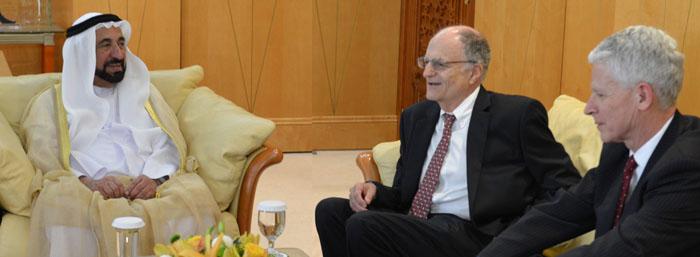- About
- Admissions
- Study at AUS
- Prospective Students
- Bachelor's Degrees
- Master's Degrees
- Doctoral Degrees
- Admission Publications
- International Students
- Contact Admissions
- Grants and Scholarships
- Sponsorship Liaison Services
- Testing Center
- New Student Guide
- File Completion
- New Student Orientation
- Payment Guide
- Executive Education
- Students with Disabilities
- Academics
- Life at AUS
- Research
- Contact Us
- Apply Now
- .

Sultan attends a lecture by Nobel Laureate Dr. Thomas Sargent
His Highness Sheikh Dr. Sultan Bin Mohammad Al Qassimi, Supreme Council Member, Ruler of Sharjah and President of American University of Sharjah (AUS), attended yesterday a lecture by Nobel Laureate Dr. Thomas Sargent, 2011 Nobel Prize winner in economics and one of the 20 most-cited economists in the world. Entitled "Euro Crisis: Sources and Its Global Implications," the lecture inaugurated American University of Sharjah's annual Nobel Laureate Lecture Series.
The lecture was attended by Sheikh Salem Bin Abdul Rahman Al Qassimi, Director General of the Ruler's Office; Dr. Amr Abdel Hamid, Advisor to His Highness the Ruler of Sharjah for Higher Education; members of AUS Board of Trustees Mr. Hamid D. Jafar, Chairman and CEO, Crescent Petroleum Company, and Mr. Maroun A. Semaan, President and CEO, Petrofac International; and Dr. Thomas Hochstettler, AUS Provost and Acting Chancellor.
In his opening remarks, Dr. Hochstettler thanked His Highness the Ruler of Sharjah for attending the lecture. "It is good to remind ourselves that from small but ambitious beginnings we have become a globally recognized university, with a faculty of high distinction and a student body of unbounded creative energy," he added.
Speaking to a packed house of students, educators and government officials, Dr. Sargent addressed the question of whether a country should or should not join a currency union. He pointed out a key reason to join a currency union as being government's expectation that a foreign entity will finance its debt burden. He added that a clear reason not to join currency union is the discomfort caused by the fiscal and monetary discipline imposed by the larger entity.
Commenting on the European crisis, Dr. Sargent said, "The problem with the European Union has been that it has not outlined what policies its member states can expect in a crisis situation. Will they get bailed out? The terms of the union are not clear and its ambiguous policy has led to decision making being delayed. Today, we are witnessing interplay of a diverse group of voters with conflicting interests within each group."
He gave examples of Panama, Ecuador and Zimbabwe as being, in effect, in a state of currency union with the US as they have adopted the US Dollar as their currency. "But the question of currency union is a superficial one," added Dr. Sargent. "The deeper question is whether a country should or should not pay its debt. Monetary union presents an opportunity to any country to avoid paying its debt as the larger, merged entity can take over its debt burden."
At a subsequent briefing session where he fielded questions from journalists from across the GCC, Dr. Sargent touched upon the issue of the GCC Monetary Union and declared that he wanted to see more Sharia compliant financing contracts in the US. He said that he was very impressed by the equity-based contracts of Sharia compliant financing. "Sharia compliant contracts make better economic sense. We in the US are highly levered with our debt. We should have more equity, a sharing of profit as well as risk. It is a mystery to me why we don't see more Sharia compliant contracts in the US," concluded Dr. Sargent.
Speaking to a group of journalists from across the GCC after his lecture, Dr. Thomas Sargent said that a monetary union will cut the ability that governments have of fiscal adjustments within their own economies as they have to be more disciplined due to lessons learned from the European crisis. "Every currency that pegs itself to the dollar has to be very close to a currency union. But I cannot answer the question of whether the GCC countries should enter a monetary union or not; it is for the stakeholders alone," he added.
Earlier, His Highness the Ruler of Sharjah met with Dr. Thomas Sargent at AUS and exchanged views on the global economic situation. The meeting was also attended by senior AUS officials.
Thomas J. Sargent was awarded the 2011 Nobel Prize in Economics, which he shared with Princeton University's Christopher Sims, for empirical research on cause and effect in the macro-economy. He is the first W.R. Berkley Professor, appointed in September 2002, by NYU's Faculty of Arts and Sciences and the Stern School of Business. Among his books are Rational Expectations and Econometric Practice, with Robert E. Lucas Jr., University of Minnesota Press, 1981; The Big Problem of Small Change, with Francois Velde, Princeton University Press, 2002; Recursive Macroeconomic Theory, with Lars Ljungqvist, MIT Press, 2004; and Robustness, with Lars Peter Hansen, Princeton University Press, 2008.
Professor Sargent is past president of the Econometric Society, the American Economic Association and the Society for Economic Dynamics. He earned his PhD from Harvard University in 1968 and was a first lieutenant and captain in the US Army. He was a university medalist as Most Distinguished Scholar in the Class of 1964 and won the Nemmers Prize in Economics in 1997. Professor Sargent was elected a fellow of the National Academy of Sciences and a fellow of the American Academy of Arts and Sciences, both in 1983.

